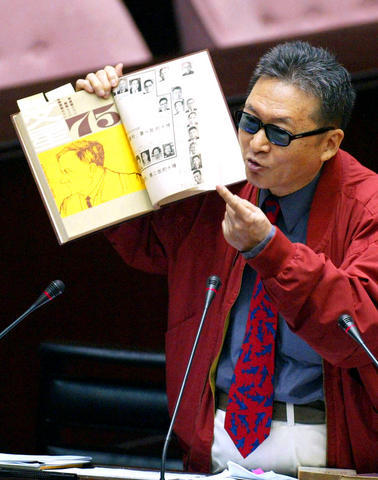Mongolian and Tibetan Affairs Commission Chairman Hsu Chih-hsiung (許志雄), a nominee for the Council of Grand Justices, caused a stir yesterday when answering a question from a pan-blue lawmaker on whether the Republic of China (ROC) existed.
"It depends from which angle you want me to answer," Hsu said. "Domestically, the ROC exists, but internationally, the ROC was replaced by People's Republic of China [PRC] in 1971 ... It's a complicated problem."
Pounding his desk, Chinese Nationalist Party (KMT) Legislator Sun Ta-chien (孫大千) responded: "You don't have to stand there [answering my questions] if you don't believe in the existence of the ROC."

PHOTO: CNA
The heated exchange happened during a legislative question-and-answer session in which lawmakers grilled four grand justice nominees. Four other grand justice nominees faced questions from lawmakers last week.
The confirmation vote takes place today, when legislators will vote to determine the president and vice president of the Judicial Yuan.
Hsu, Yeh Jiunn-rong (葉俊榮), a law professor at National Taiwan University, Liu Shing-i (劉幸義), a law professor at National Taipei University, and Yeh Sai-ying (葉賽鶯), a retired Supreme Court justice, said that they had been put on the pan-blue camp's blacklist.
The four nominees are known for their affiliation with the Democratic Progressive Party (DPP).
DPP legislative caucus whip Ker Chien-ming (柯建銘) said later yesterday that the worst-case scenario today would see half of the eight grand justice nominees voted down.
The nominees need to gain confirmation from more than half, or 109, of the 217 lawmakers to meet the Constitutional requirement. The DPP and its pan-green ally the Taiwan Solidarity Union together hold just 96 legislative seats.
KMT Legislator Wu Yu-sheng (
Pan-blue lawmakers took issue with Liu, saying he was not qualified to be a grand justice because he presents most of his law classes in Hoklo, or Taiwanese, not Mandarin.
KMT Legislator Chang Jen-hsiang (
Liu, who started to teach law in Taiwanese in 1989, said he decided to do so because he felt sad about the rapid decline of the language.
"Many young students are not used to their mother tongue, and they even discriminate against it," Liu said, adding that he only taught optional classes in Taiwanese and that he always let students know in advance so that they could register for other classes if the language is a problem for them.
Meanwhile, lawmakers yesterday again failed to reach a consensus on the design of the ballot for the confirmation of the grand justice nominees.
The pan-blue camp prefers one grand justice nominee per ballot and one box per nominee, as this would help the party monitor how its lawmakers voted, while the DPP favors one ballot for all eight nominees and using four boxes.
Lawmakers will vote on the ballot design before the confirmation vote starts.

The brilliant blue waters, thick foliage and bucolic atmosphere on this seemingly idyllic archipelago deep in the Pacific Ocean belie the key role it now plays in a titanic geopolitical struggle. Palau is again on the front line as China, and the US and its allies prepare their forces in an intensifying contest for control over the Asia-Pacific region. The democratic nation of just 17,000 people hosts US-controlled airstrips and soon-to-be-completed radar installations that the US military describes as “critical” to monitoring vast swathes of water and airspace. It is also a key piece of the second island chain, a string of

A magnitude 5.9 earthquake that struck about 33km off the coast of Hualien City was the "main shock" in a series of quakes in the area, with aftershocks expected over the next three days, the Central Weather Administration (CWA) said yesterday. Prior to the magnitude 5.9 quake shaking most of Taiwan at 6:53pm yesterday, six other earthquakes stronger than a magnitude of 4, starting with a magnitude 5.5 quake at 6:09pm, occurred in the area. CWA Seismological Center Director Wu Chien-fu (吳健富) confirmed that the quakes were all part of the same series and that the magnitude 5.5 temblor was

The Central Weather Administration has issued a heat alert for southeastern Taiwan, warning of temperatures as high as 36°C today, while alerting some coastal areas of strong winds later in the day. Kaohsiung’s Neimen District (內門) and Pingtung County’s Neipu Township (內埔) are under an orange heat alert, which warns of temperatures as high as 36°C for three consecutive days, the CWA said, citing southwest winds. The heat would also extend to Tainan’s Nansi (楠西) and Yujing (玉井) districts, as well as Pingtung’s Gaoshu (高樹), Yanpu (鹽埔) and Majia (瑪家) townships, it said, forecasting highs of up to 36°C in those areas

IN FULL SWING: Recall drives against lawmakers in Hualien, Taoyuan and Hsinchu have reached the second-stage threshold, the campaigners said Campaigners in a recall petition against Chinese Nationalist Party (KMT) Legislator Yen Kuan-heng (顏寬恒) in Taichung yesterday said their signature target is within sight, and that they need a big push to collect about 500 more signatures from locals to reach the second-stage threshold. Recall campaigns against KMT lawmakers Johnny Chiang (江啟臣), Yang Chiung-ying (楊瓊瓔) and Lo Ting-wei (羅廷瑋) are also close to the 10 percent threshold, and campaigners are mounting a final push this week. They need about 800 signatures against Chiang and about 2,000 against Yang. Campaigners seeking to recall Lo said they had reached the threshold figure over the